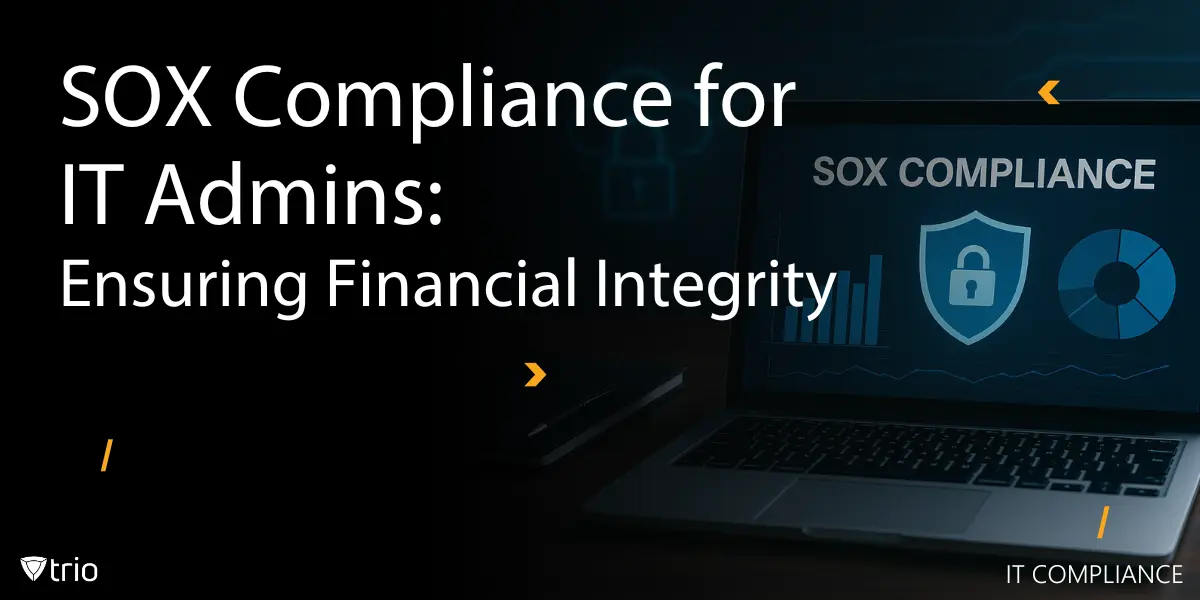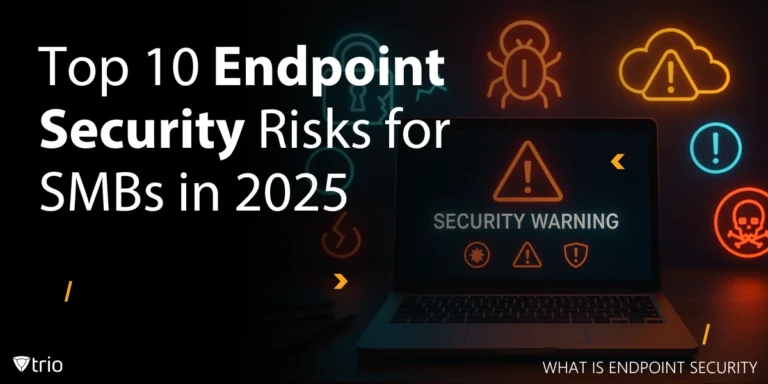SOX compliance, defined as adherence to the Sarbanes-Oxley Act of 2002, is a federal mandate born from major corporate scandals like Enron, Tyco International, and WorldCom, which eroded public trust in financial markets. Enacted to restore confidence, the Sarbanes-Oxley Act sets stringent requirements for U.S. public companies to ensure accurate financial reporting and robust internal controls. For IT administrators at small to medium-sized businesses (SMBs), mastering SOX IT compliance is critical to safeguarding financial data, preventing fraud, and meeting regulatory demands. This comprehensive guide explores SOX compliance, its importance, key requirements, practical steps for implementation, and how tools like Trio can streamline the process for IT admins at SMBs.
Why SOX Compliance Matters for IT Admins
SOX compliance is a cornerstone of financial governance and IT compliance for public companies, and IT systems are at the heart of compliance efforts. For IT admins at SMBs, understanding and implementing SOX requirements is essential for several reasons:
- Financial Integrity: SOX ensures the accuracy and reliability of financial reporting, which relies heavily on secure IT systems to store, process, and protect financial data.
- Investor Confidence: By enforcing transparency, SOX restores faith in financial markets, making it critical for IT admins to maintain systems that support accurate disclosures.
- Corporate Accountability: Executives are held accountable for financial statements, and IT admins play a pivotal role in ensuring the systems they oversee provide reliable data for these certifications.
- Fraud Prevention: Robust IT controls help detect and prevent fraudulent activities, such as unauthorized access or data manipulation, which could otherwise lead to significant financial losses.
For SMBs, where resources may be limited, IT admins often wear multiple hats, making their role in SOX compliance even more critical. A single misstep in IT controls can lead to non-compliance, risking penalties, reputational damage, and loss of investor trust.
Key SOX Sections for IT and Security
The Sarbanes-Oxley Act includes 11 titles, but three sections are particularly relevant for IT admins due to their focus on financial reporting and data security:
- Section 302: Requires CEOs and CFOs to personally certify the accuracy of financial reports. IT admins must ensure that systems generating these reports are secure, accurate, and auditable, as any discrepancies could lead to executive liability.
- Section 404: Mandates that management and external auditors establish and evaluate internal controls to ensure the reliability of financial reporting. This places a heavy burden on IT to implement and maintain controls like access management and audit trails.
- Section 802: Imposes strict penalties for altering, destroying, or falsifying records. IT admins must ensure that financial data is securely stored, backed up, and protected from tampering to comply with this section.
These sections underscore the importance of IT in maintaining data integrity, enforcing security measures, and providing auditable evidence of compliance.
Essential SOX Internal Controls for IT Admins
To achieve SOX IT compliance, IT admins at SMBs must implement a robust set of internal controls tailored to financial systems. These controls ensure data security, prevent unauthorized access, and maintain auditability. Key controls include:
- Access Controls: Implement role-based access controls (RBAC) to restrict financial system access to authorized personnel only. Use multi-factor authentication (MFA) to enhance security.
- Audit Trails: Maintain detailed, tamper-proof logs of all financial transactions, system changes, and user activities to provide auditors with a clear record of events.
- Data Encryption: Encrypt financial data both in transit and at rest to protect against breaches and ensure compliance with data protection requirements.
- Segregation of Duties: Ensure no single employee has control over multiple aspects of financial processes, such as initiating and approving transactions, to prevent fraud.
- Change Management: Document and monitor all changes to financial systems, including software updates, configuration changes, and access modifications.
- Regular Backups: Securely back up financial data with restricted access to backups, ensuring data recovery in case of loss or tampering.
- Network Security: Deploy firewalls, intrusion detection systems, and regular vulnerability scans to protect financial systems from external threats.
Implementing these controls requires careful planning and ongoing maintenance, but they are essential for SOX audit readiness and protecting SMBs from compliance risks.
MDM: Your SOX Enforcement Engine
Master Data Management (MDM) plays a critical role in supporting compliance with Sarbanes-Oxley (SOX) mandates by ensuring the accuracy, consistency, and traceability of financial and operational data. By aligning MDM capabilities with SOX requirements, organizations can strengthen internal controls, reduce data-related risks, and improve audit readiness. This mapping helps bridge data governance practices with regulatory compliance objectives.
| SOX Requirement | MDM Control | Auditor Evidence |
|---|---|---|
| Access Management | Role-based app access, step-up MFA | User-device-app access logs |
| Data Integrity | Containerization, DLP blocking | Screenshot prevention, activity trails |
| Record Preservation | 90-day immutable activity logs | Geo-timestamped file access history |
| Change Control | Automated policy deployment | Configuration change audit reports |
SOX Compliance Checklist for IT Admins
To simplify SOX IT compliance, IT admins can follow this detailed checklist to ensure readiness for audits:
- Document Processes: Create comprehensive documentation of all financial and IT processes, including data flows, system configurations, and control procedures.
- Implement Access Controls: Enforce strict user authentication, RBAC, and MFA for financial systems to prevent unauthorized access.
- Maintain Audit Trails: Ensure all financial transactions and system activities are logged in a secure, tamper-proof system for auditor review.
- Conduct Risk Assessments: Perform quarterly risk assessments to identify vulnerabilities in IT systems, such as outdated software or weak access controls.
- Test Internal Controls: Regularly test controls to verify their effectiveness, such as simulating unauthorized access attempts to validate RBAC.
- Train Staff: Provide ongoing training for employees on SOX requirements, IT security best practices, and the importance of compliance.
- Use Automation Tools: Deploy tools like MDM or GRC platforms to automate compliance tasks, such as logging or policy enforcement.
- Prepare for Audits: Organize all documentation, logs, and control evidence in a centralized repository for easy auditor access.
This checklist serves as a roadmap for IT admins to achieve and maintain SOX compliance, reducing the risk of oversight during audits.

Real-World Examples of SOX Compliance Violations
SOX violations can have devastating consequences, as demonstrated by real-world cases:
- Enron (2001): Before SOX was enacted, Enron falsified financial statements to hide billions in debt, leading to its collapse and the loss of thousands of jobs. Weak IT controls allowed executives to manipulate financial data undetected, highlighting the need for robust audit trails and access controls. This scandal directly inspired the Sarbanes-Oxley Act.
- HealthSouth (2003): Executives at HealthSouth inflated earnings by $1.4 billion through fraudulent accounting practices. Inadequate IT controls, such as poor audit trails and lax access management, enabled the manipulation. The company faced hefty fines, and several executives were imprisoned, underscoring the importance of IT in preventing fraud.
- Toshiba (2015): Toshiba overstated profits by $1.2 billion over seven years due to weak internal controls and lack of oversight. Insufficient IT audit mechanisms failed to detect discrepancies, resulting in significant fines and a damaged reputation.
These cases illustrate the critical role IT admins play in preventing violations through strong controls and vigilant monitoring.
The SOX Audit Process: What IT Admins Need to Know
A SOX compliance audit is a rigorous evaluation of an organization’s adherence to SOX requirements, with a significant focus on IT systems. Auditors typically:
- Review Internal Controls: Examine the design and effectiveness of IT controls, such as access management, encryption, and segregation of duties, to ensure they prevent errors or fraud.
- Examine Audit Trails: Verify that logs are comprehensive, accurate, and tamper-proof, covering all financial transactions and system changes.
- Test Risk Management: Assess how IT systems identify and mitigate risks, such as vulnerabilities in financial software or inadequate backup procedures.
- Investigate Fraud Risks: Look for signs of data tampering, unauthorized access, or other indicators of misconduct within IT systems.
For IT admins, preparing for an audit involves maintaining detailed documentation, testing controls regularly, and ensuring all logs are accessible and accurate. Auditors may also interview IT staff to verify processes, so training and clear communication are essential.
Tools to Automate SOX Compliance
Automation is a game-changer for SOX IT compliance, especially for resource-constrained SMBs. Tools that streamline compliance tasks include:
- Mobile Device Management (MDM): Mobile Device Management solutions like Trio secure financial data on mobile devices, enforce access controls, and provide audit-ready logs. Trio supports SOX compliance by offering data encryption, remote wipe capabilities, and policy enforcement.
- Governance, Risk, and Compliance (GRC) Platforms: Tools like LogicGate or OneTrust automate control documentation, risk assessments, and compliance reporting, reducing manual effort.
- Security Information and Event Management (SIEM) Systems: Splunk or IBM QRadar monitor and log system activities in real-time, ensuring comprehensive audit trails.
- Identity Management Solutions: Okta or SailPoint manage user access and enforce segregation of duties, critical for SOX compliance.
Trio, in particular, is tailored for SMBs, offering:
- Data Security: Encrypts sensitive financial data on devices to prevent breaches.
- Access Control: Restricts access to authorized users with granular permissions.
- Audit Trails: Logs all device activities for compliance reporting.
- Remote Wipe: Erases data from lost or stolen devices to mitigate risks.
- Policy Enforcement: Automatically applies compliance policies across devices, reducing human error.
By integrating tools like Trio, IT admins can simplify compliance while enhancing overall security.
Challenges in SOX Compliance and How to Overcome Them
SMBs face unique challenges in achieving SOX compliance, but strategic approaches can mitigate these obstacles:
- Cost: Compliance can strain budgets, especially for smaller firms.
- Solution: Leverage cost-effective tools like open-source GRC platforms or scalable MDM solutions like Trio to reduce expenses while maintaining robust controls.
- Complexity: SOX requirements are intricate and require expertise.
- Solution: Invest in targeted training for IT staff and use automation tools to simplify tasks like logging and reporting.
- Ongoing Maintenance: Compliance is not a one-time effort but requires continuous monitoring.
- Solution: Schedule quarterly audits, use real-time monitoring tools like SIEM systems, and maintain up-to-date documentation to stay proactive.
- Resource Constraints: SMBs often lack dedicated compliance teams.
- Solution: Empower IT admins with automation and clear processes to handle compliance tasks efficiently.
By addressing these challenges proactively, IT admins can build a sustainable compliance framework that aligns with SOX requirements.
Conclusion
For SMBs, SOX compliance now hinges on one question: Can you prove financial data integrity on every mobile device; corporate and BYOD?
Your 90-Day Roadmap:
- Weeks 1–4: Discover all mobile financial access points (Trio’s free audit tool).
- Weeks 5–8: Deploy MDM controls for critical/high-risk device tiers.
- Weeks 9–12: Conduct a mock SOX audit using Trio’s evidence packs.
Mobile SOX controls must be:
- Auditable (logs covering 100% of devices)
- Enforceable (automated policy deployment)
- Transparent (real-time executive dashboards)
Ready for Unshakeable SOX Compliance?
Start Trio MDM Trial – Deploy pre-configured controls in 15 minutes, or check out Trio’s free demo today! Don’t just meet regulatory standards—set the bar for financial integrity in your organization.
Frequently Asked Questions
Unsecured BYOD access to financial systems – 68% of SOX audit failures stem from unmanaged mobile access to ERP/accounting apps (PwC 2023). Trio’s containerization solves this by isolating corporate financial data from personal apps on employee phones.
Follow this cadence for audit-ready compliance:
| Control Type | Test Frequency | Evidence Required |
|---|---|---|
| Access Reviews | Quarterly | RBAC reports + MFA logs |
| Change Management | Monthly | Ticketing system audits |
| Backup Verification | Weekly | Automated success/failure alerts |
Get Ahead of the Curve
Every organization today needs a solution to automate time-consuming tasks and strengthen security.
Without the right tools, manual processes drain resources and leave gaps in protection. Trio MDM is designed to solve this problem, automating key tasks, boosting security, and ensuring compliance with ease.
Don't let inefficiencies hold you back. Learn how Trio MDM can revolutionize your IT operations or request a free trial today!





